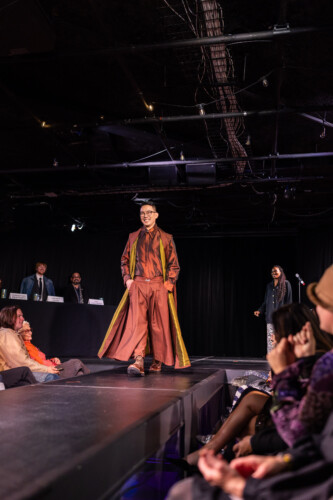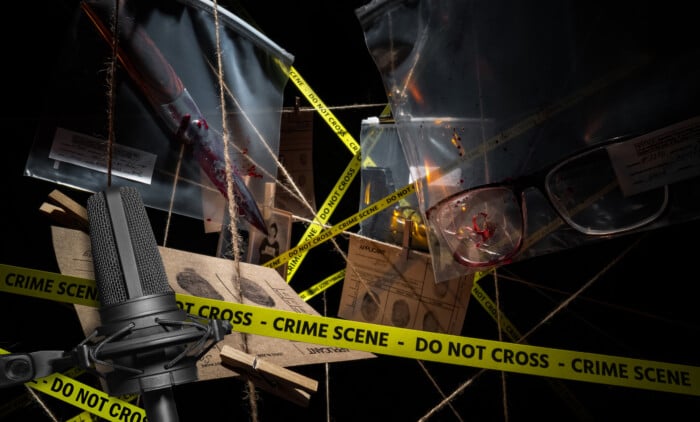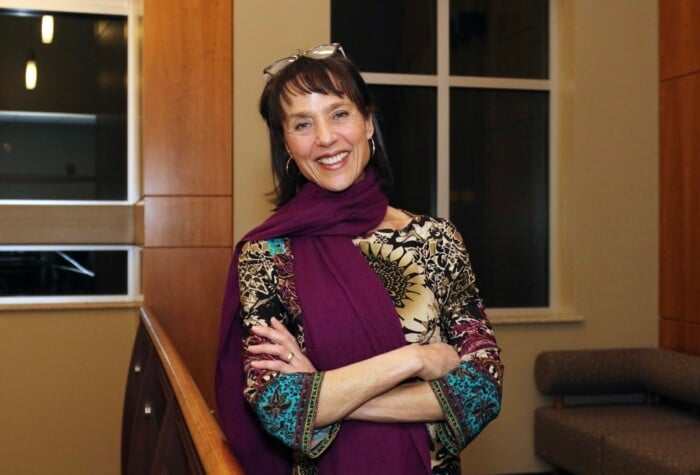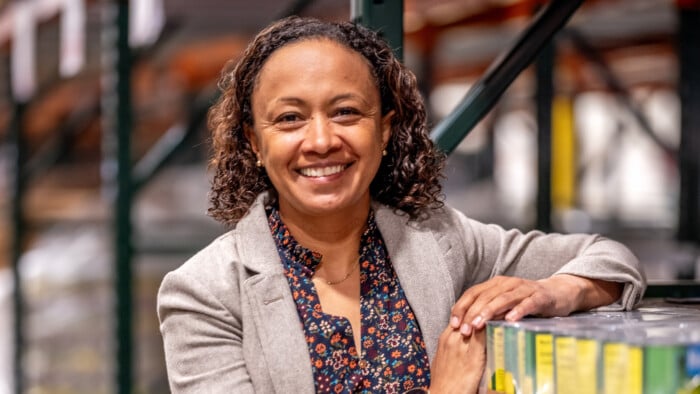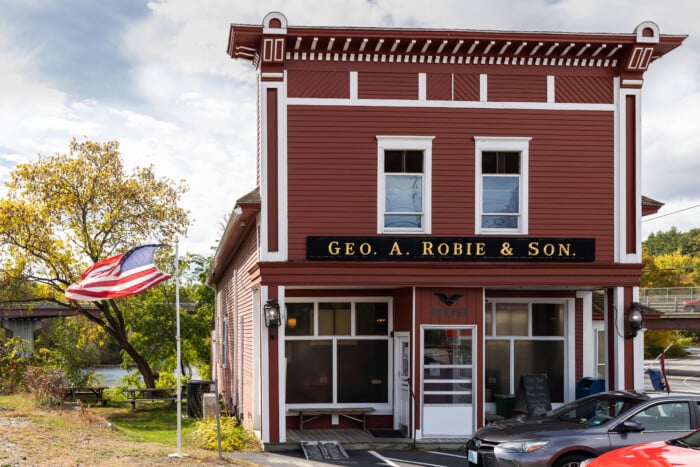Fashioning the Future with Project Upcycle
Project Upcycle is redefining sustainability and style in New Hampshire
The lights soften, and a hush falls over the crowd of fashionably dressed locals. The music fades as Gemma Soldati steps onto the stage as the boisterous emcee, wearing 2020’s winner Elias Matso’s unique design, to guide spectators through the evening of Project Upcycle 2024, nearly a decade in the running, selling out tickets every year and celebrating its All Stars challenge this month.
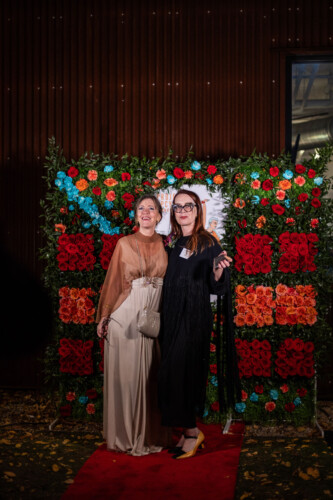
Project Upcycle founder Jennifer Moore (right) stands with her sister (and first supporter), Diane Coon.
The show is held continuously at Portsmouth’s 3S Artspace, a creative hub that includes gallery and performance spaces, whose executive director and co-founder of Project Upcycle, Beth Falconer, has prided herself on dedication to nonprofits and their role in sustaining healthy and creative communities.
Project Upcycle launched in 2018 when Jennifer Moore approached 3S Artspace with her idea inspired in part by the popular reality show Project Runway, only this time with a format that promotes the planet and its people.
Similar to its predecessor, Project Upcycle is a fierce competition between budding and established designers looking to take the next step in their careers by competing for a cash prize of $1,500, only instead of shopping at the famous Mood Fabrics in New York City, they’re challenged to upcycle materials that may normally find themselves in landfills.
Last year’s competition was materially sponsored by Savers, where the competitors have 20 minutes to shop, as well as donations of fabric from Marden’s, who found themselves with surplus. The contenders then have 24 hours to conceptualize their garments, as well as completely construct them, eventually presenting their creations to a judge and an audience.
Before declaring a winner, the designs are showcased on a runway, in front of a crowd that overflows the 3S Artspace Performance Space, using community role models in place of fashion models — a move that Beth Falconer mentions “is another testament to the commitment of the idea that fashion is for everyone and everybody,” and then later facing scrutiny and inspection of their garments by the judges, some of whom are previous cycle winners.
Last year’s judges were Jay Calderin, the founder of Boston Fashion Week; Christian De Restrepo, a Columbian-born immigrant who is now an established designer in the Boston fashion scene; and Henry Hawk, a student at the Rhode Island School of Design who competed during his senior year and won.
Henry has since continued making garments with an upcycled twist, using primarily denim as his fabric of choice and comments on the process of upcycling as “a favorite creative challenge, taking something apart and rearranging, rethinking it is surprisingly rewarding, and often leads to unpredictable outcomes. Each panel of cloth is an abstract puzzle, but when you arrange the puzzle it’s way more rewarding than the puzzle on your coffee table. You can wear this one!”
The upcycling aspect is what truly sets it apart from many design competitions and with sustainability at the forefront of what Jennifer Moore and 3S stand for. The event attracts business partnerships and community members in a shared celebration of creative risk-taking and sustainability, with many of the designers forming lasting relationships with their peers and gaining access to professionals. Project Upcycle is poised to keep growing in today’s climate of ever-growing proponents against fast fashion.
Moore says she began in the sustainable fashion world, first accidentally, and then on purpose. After writing on the topic of sustainability for many years through her blog Recovergirl, which is a wordplay on Covergirl with the “re” added in front, to represent the ubiquitous phrase “reduce, reuse, recycle,” Moore was recruited by The Sound as a columnist to write on the topic of sustainable fashion. It would eventually prove so successful, the column became its own magazine, StyleQueue. Later, she initiated the Portsmouth Clothing Swap, which today draws in more than 1,000 people, saving countless garments from the landfill, and has become an official City of Portsmouth event.
Her passion for sustainability eventually turned into a fun challenge she called “Project Black Friday,” when she joined together with her friend Kirsten Elfe, to rent Buoy gallery in Kittery, Maine, and devote a day to sewing. It was aptly named, as the only available day the gallery had to rent was Black Friday, which Jennifer said felt “fortuitous.” What started as a challenge between friends grew by a handful more people the following year, was covered by a local paper, and later inspired the entirety of Project Upcycle, as an obvious up-leveling after the buzz around it just wouldn’t die down.

Ashley Cushon is the 2024 winner after an elite panel of judges evaluates her designs based on execution, creative reuse of materials and styling.
It’s no easy feat to win this competition, amid a sea of talented individuals who are scouted throughout New England, all vying for the same prize with the same level of determination. But Ashley Cushon was one of many deserving applicants, who proved her design to the judges (and the audience, winning the “audience choice” award) and became the winner of Project Upcycle 2024 with her unique take on a traditional Korean garment called a Hanbok. Cushon was deeply inspired by her assigned community role model Doug Ridley in what she says felt like “divine intervention.”
“Before we were even paired, Doug had already intrigued me. Our brief conversation before model selection left an impression — I recognized in him the delicate balance of standing out while feeling like an outsider, of minimizing oneself in spaces that passively suppress self-expression. I left that exchange hoping he’d be paired with a designer who would truly let him shine. And then our pairing was announced, and I lost it — in the best way!” says Cushon.
“Although Doug didn’t engage with many traditional Korean customs; he shared that food was his strongest tie to his heritage. That small but powerful detail sparked a vision: to cloak Doug in the beauty of his roots, reconnecting him with his culture through my creative lens — almost in a way that would feed his spirit.”
And that she did — her design not only felt inspired, but it was impeccably executed, and the judges agreed, crowning her winner of Project Upcycle 2024.
Elias Matso, a previous winner and contributor in many ways to Project Upcycle, who is now a fashion student of Polimoda, The Fashion School in Florence, Italy, said something profound about Moore. “She has led very selflessly and not for her own gain, but really to connect people and give people these experiences and opportunities. She makes this web of creative people on the Seacoast,” he says. “She does it in a very genuine, non-transactional way. Which is really rare.”
